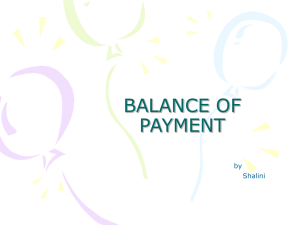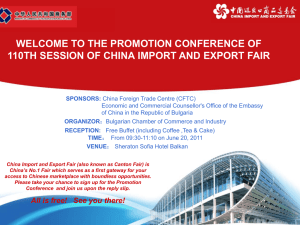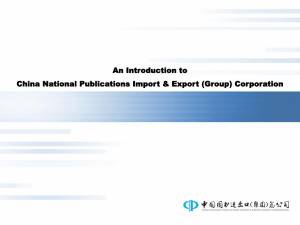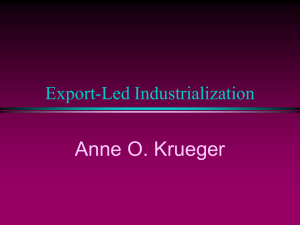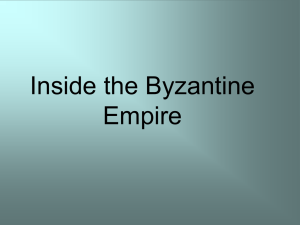claims & arbitration
advertisement
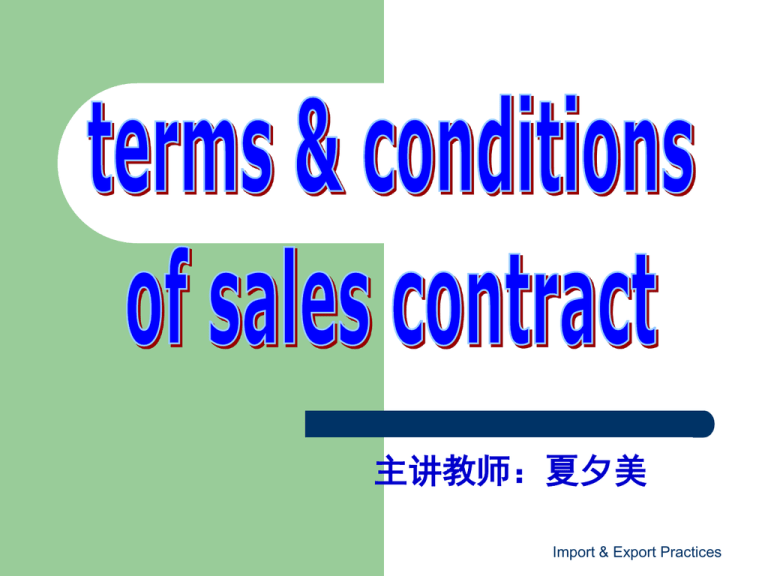
主讲教师:夏夕美 Import & Export Practices all the terms and conditions agreed upon Description of commodity Quantity Package Price Body Payment Transport Insurance Inspection Claims & dispute Import & Export Practices 主讲教师:夏夕美 Import & Export Practices one two Breach of Contract claims Import & Export Practices 1. Breach of Contract Breach of contract means the refusal or failure by a party to a contract to fulfill an obligation imposed on him under that contract, resulting from, e. g. , repudiation of liability before completion, or conduct preventing proper performance. Import & Export Practices 1. Breach of Contract where it has the effect of depriving The contract discharged where theis party who has the breach results in the further undertakings still to innocentof party treating itthe as perform substantially rescinded and which it was the whole benefit intention of the parties as expressed in the contract as the consideration for performing those undertaking. Import & Export Practices The kinds of Breach of Contract 1) Breach by the Seller 2) Breach by the Buyer 3) Both Parties are held responsible Import & Export Practices 各国法律对违约的不同规定 1、英国法的规定 违反要件(Breach of Condition) 违反担保(Breach of Warranty) 2、美国法的规定 重大违约(Material Breach of Contract) 轻微违约(Minor Breach of Contract) Import & Export Practices 各国法律对违约的不同规定 3、《公约》的规定(第25条) 根本性违约(Fundamental Breach of Contract) 非根本性违约(Non-Fundamental Breach of Contract) 4、我国《合同法》的规定 一方违约,另一方有权要求赔偿损失或者采取其他 的合理补救措施,若取其他的合理补救措施仍然不 能完全弥补损失,另一方仍有权要求赔偿损失。 若双方违约,各自承担相应的责任 Import & Export Practices 违约分类 英国 美国 后果 违反要件 受损害方可宣告合同无 效,并要求损害赔偿 违反担保 要求损害赔偿或救济 重大违约 轻微违约 根本性违约 公约 非根本性违约 Import & Export Practices 2. Claim and Satisfaction Claim means that in international trade, one party breaks the contract and causes losses to the other party Satisfaction means that the directly or indirectly, the party party breaking the contract suffering the losses may ask for declares that he will accept and compensation for the losses. handle the claim. Import & Export Practices 2. Claim and Satisfaction In import and export business, claims regarding quality and quantity or weight are common, even though proper inspection of the goods has been conducted by designated surveyors or public inspection bureaus. The goods may have been damaged or lost during transit. Import & Export Practices To file or to settle a claim, the following points should be first considered: (1) whether the claim is justified by the contract (2) whether the claim is made in time whether the claim is well (3) supported by good documentation Import & Export Practices settle the claim The sellers may settle the claim upon the agreement of the buyers in the following three ways: Import & Export Practices (1) Agree to the rejection of the and bear all direct losses and goods and refund to the buyers expenses incurred from the the value of the rejected goods rejection, including interest, in the same currency as banking charges, freight, contracted herein, insurance premium, inspection charges, storage charges and all other necessary expenses required for the custody and protection of the rejected goods. Import & Export Practices (2) Devaluate the goods according to the degree of inferiority, extent of damage and amount of losses suffered by the buyers. Import & Export Practices (3) Replace the defective goods with new ones which conform to the specification, quality and performance as stipulated in the contract, and bear all expenses incurred and direct losses sustained by the buyers. The sellers shall, at the same time, guarantee the quality of the replaced goods for a further agreed period. Import & Export Practices 3. Claim Clause in the contract In some contract, the two parties often stipulate clauses on settlement of claim as well as inspection and claim clauses. Import & Export Practices Claim Clauses 1) Discrepancy and claim clause 2) Penalty clause Import & Export Practices 1) The discrepancy and claim clause For a moderate contract the buyer should makeaa general merchandise, of claim against the seller the time discrepancy and within claim clause is limit of included. re-inspection and claim often with the support of a survey In case the goods delivered are report issued by a surveyor inconsistent with the contract accepted by the seller. stipulations for quantity, quality, packaging, etc, Import & Export Practices Problems Should be Paid 索赔金额:一般只做笼统规 Attention to When a 定,应该包括实际损失加上 Buyer Files a Claim 预期利润 (1) Proofs for claiming (2) Claim amount (3) Claim Period (4) Seller's Responsibility for 《公约》规定若合同没有约定索赔期限,子 Settlement 买方实际收到货物之日起算2年内索赔 Import & Export Practices In case of quality discrepancy, claim should be lodged by the Buyers within 30 days after the arrival of the goods at the port of destination, while for quantity discrepancy, claim should be lodged by the Buyers within 15 days after the arrival of the goods at the port of destination. Import & Export Practices In all cases, claims must be accompanied by Survey Reports of Recognized Public Surveyors agreed to by the Sellers. Import & Export Practices Should the responsibility of the subject under claim be found to rest on the part of the Sellers, the Sellers shall, within 20 days after receipt of the claim, send their reply to the Buyers together with suggestion for settlement. Import & Export Practices 2) Penalty clause For a contract covering a huge shipment of goods or high A penalty is often a as a value equipment such certain plant, percentage complete a penalty of the total contract clause may also be included value. and quoted when one party fails to implements the contract such as non-delivery, delayed delivery, etc. Import & Export Practices 2) Penalty clause but paying the penalty does not mean that the contract can be avoided. In other words, the party that has failed to implement the contract must carry out his contract obligations in spite of his payment of the penalty. Import & Export Practices 2) Penalty clause 定金不同于预付款: 预付款又称订金,不具有担保合同履行的 作用,收取订金的一方违约,只需要退还 预付款即可。而收取定金的一方则需要双 倍返还定金。 Import & Export Practices 案例分析1: –中国某公司与欧洲某进口商签定一份皮具 合同,以CIF鹿特丹成交,向保险公司投 保一切险,用信用证支付。货到鹿特丹后, 检验结果表明:全部货物潮湿、发霉、变 色,损失价值10万美元。据分析,货物损 失的主要原因是由于生产厂家在生产的最 后一道工序中,未将皮具湿度降到合理程 度。 Import & Export Practices 案例分析1: –问: –1、进口商对受损货物是否支付价款? –2、进口商应向谁索赔? Import & Export Practices 案例分析2 某国一公司以CIF鹿特丹出口食品1000箱, 即期信用证付款,货物装运后,出口商凭 已装船清洁提单和已投保一切险及战争险 的保险单,向银行收妥货款。货到目的港 后,经进口商复验发现下列情况: 1.该批货物共有10个批号,抽查20箱,发 现其中2个批号涉及200箱内含有沙门氏细 菌超过合同标准; Import & Export Practices 案例分析2 2.收货人实际收到998箱,缺少2箱; 3.有15箱货物外表状况良好,但箱内货 物共缺少60公斤; 问:根据上述案情,进口商应分别向谁 索赔? Import & Export Practices 主讲教师:夏夕美 Import & Export Practices Disputes In international trade, disputes often arise between the two parties when one party thinks that the other fails to carry out the duties stipulated in the contract wholly or partially, which very likely leads to claim, arbitration and legal action. Import & Export Practices Dispute commonly to be settled by 3 ways: Consultation Conciliation Arbitration Litigation Import & Export Practices If the disputes cannot be settled through amicable negotiation or mediation, arbitration will be the next best alternative, as litigation is usually costly and timeconsuming. Import & Export Practices The definition of arbitration Arbitration means that the two parties, before or after the disputes arise, reach a written agreement that they will submit the disputes which cannot be settled through amicable negotiations to the third party for arbitration. Import & Export Practices The definition of arbitration In other words, both parties while disputing, according to the agreement between both sides, choose certain organization as the third part, to judge the fact of the dispute or the rights and obligations, thus solve the dispute. Import & Export Practices Arbitration before the disputes arise is chosen on basis of arbitration clause in contract Arbitration after the disputes arise is chosen on basis of a written agreement of arbitration Import & Export Practices The functions of arbitration agreement 3) The arbitration agreement 1) Arbitration agreement of is the eliminates the jurisdiction basisover for settlement disputes, court the relativeof case. In and an is binding upon both parties. case arbitration agreement is reached, the warranty interested parties 2) It is the for can’t appeal authorities to the courtand arbitration anymore. arbitrators to obtain the jurisdiction. Import & Export Practices Arbitration: All disputes in connection with this Contract or the execution there of shall be amicably settled through negotiation. In case no settlement can be reached between the two Parties, the case under dispute shall be submitted to the Trade Arbitration Commission of the China Council for the Promotion of International Trade for arbitration. Import & Export Practices The arbitration shall take place in Beijing, China and shall be executed in accordance with the Provisional Rules of Procedure of the said Commission and the decision made by the Arbitration Commission shall be accepted as final and binding upon both parties. The fees for arbitration shall be borne by the losing Party unless otherwise awarded. Import & Export Practices Advantage of arbitration Arbitration provides an economic, expeditious and informal remedy for settlement of commercial disputes as the circumstances allow. Arbitration proceedings are conducted in privacy and the awards are kept confidential. Import & Export Practices 仲裁的特点及与诉讼的区别 协商和调解强调自愿性,双方都同意才能 进行; 诉讼不存在自愿问题,诉讼的提起可以单 方面进行,审理后的判决也具有强制性; 仲裁方式既有自愿性的一面,又有强制性 的一面。自愿性主要体现在仲裁的提起, 要有双方达成的协议;强制性则表现在仲 裁裁决是终局性的,双方必须遵照执行。 Import & Export Practices 仲裁的特点及与诉讼的区别 对于双方当事人来说,仲裁比诉讼具有 较大的灵活性,因为仲裁员不是由国家 任命而是由双方当事人指定的。而且仲 裁员一般都是贸易界的知名人士或有关 方面的专家,比较熟悉国际贸易业务, 处理问题一般比法院迅速及时,费用也 比较低。 Import & Export Practices Issues should be considered in the negotiation of arbitration : Add Your Text Add Your Text Arbitration flow Applicable arbitration rules Add Your Text Place of Arbitration Arbitration Body Add Your Text Import & Export Practices 1. Arbitration Body 1) A B C permanent organization: provides facilities and personnel the International Chamber of Commerce ( ICC ) ; American Arbitration Association the China International Economic and Trade Arbitration Commission. Import & Export Practices 1. Arbitration Body 2) temporary arbitration tribunal : set up for a particular dispute. Import & Export Practices 2. Place of Arbitration We shouldfor tryarbitration: our Locations best to choose the national arbitration anywhere in the seller's country, organ or the the buyer's country or a third arbitration organ of country. the third country. Import & Export Practices 3. Applicable arbitration rules arbitration rules of the China International Economic and Trade Arbitration Commission. Import & Export Practices 4. Arbitration case flow 1) Submit dispute to arbitration: If a dispute is to submitted to a permanent organization, the application is sent directly to the tribunal and to the defendant (also called respondent). If the dispute is to be submitted to a temporary organization, the application is sent directly to the defendant. Import & Export Practices 4. Arbitration case flow 2) Appoint arbitration: must Judicialpoints systems do be not allow the parties to a dispute in to choose considered their selecting own judges. arbitrator: In contrast, offers the number arbitration of arbitration parties the unique and opportunity to designate persons of of their choice qualifications as arbitrators. arbitrators. Import & Export Practices 4. Arbitration case flow Another possibility is that aachief arbitrator Normally board of arbitration is appointed by the consists of three arbitrators. arbitration Firstly, the plaintiff and the organization defendant chooseand onethe arbitrator chief arbitrator respectively. appoints two other Then, a third arbitrator is arbitrators. appoint by the arbitration organization. Import & Export Practices 4. Arbitration case flow It is also important to consider the qualifications of the arbitrators, particularly the nationality and the professional background, to ensure an impartial and quality award. Import & Export Practices 4. Arbitration case flow 3) Hear a case: Case hearing can be carried out by face-to-face reply or correspondence. In some countries, the tribunal can give the order of interim measures of protection while the arbitration is going on. Import & Export Practices 4. Arbitration case flow 4) Issue an award: After the hearing, the arbitrator will deliberate the case and then serve an award the decision make by the arbitration tribunal after deliberation. It must be in written form with or without explanations or reasons. Import & Export Practices * Effect of arbitration Award An arbitration award is “final and binding” in most countries provide that there are no illegal actions by any party involved in the arbitration process. Import & Export Practices * Effect of arbitration Award In other words, an arbitration award is subject to review by a court only on a very limited basis. If one party refuses to obey the award, the other can ask a court to enforce the implementation of the award. Import & Export Practices * Fees Fees can be borne by the losing party of the dispute, can be divided between the two parties or can be paid according to the award. Import & Export Practices 案例分析: 甲方与乙方签定了出口某货物的合同一份, 合同中的仲裁条款规定:“凡因执行本合 同发生的一切争议,双方同意提交仲裁, 仲裁在被诉方国家进行。仲裁裁决是终局 的,对双方都有约束力。”合同履行过程 中,双方因品质问题发生争议,于是将争 议提交甲国仲裁。经仲裁庭调查审 Import & Export Practices 案例分析: 理,认为乙方的举证不实,裁决乙方败 诉。事后甲方因乙方不执行裁决向本国 法院提出申请,要求法院强制执行,乙 方不服。 问:乙方可否向本国法院提请上诉?为 什么? Import & Export Practices 主讲教师:夏夕美 Import & Export Practices 1. Definition of force majeure •Force majeure means that the frustration of the contract by the party in question results from natural or social forces beyond the control of man. Import & Export Practices 1. Definition of force majeure •This party shall be free from liability for performance, or be given an option of prolonging the performance of the contract owing to the above-mentioned event or series of events. Import & Export Practices 2. Features of force majeure A force majeure event should have the following features: 1 2 3 Externality Unforeseeability Unavoidability Import & Export Practices 1 Externality it is not due to the negligence of the buyer or the seller; Import & Export Practices 2 Unforeseeability it happens after the contract is signed and is unforeseeable at the time of conclusion of the contract; Import & Export Practices neither the buyer nor the seller can control the situation and it is completely impossible to perform the obligation. 3 Unavoidability Import & Export Practices 补充: 英美法中——“合同落空” 它是指买卖合同签订后,不是由于合同 当事人的过失或疏忽,而是由于发生了 大陆法系—— “情势变迁”或“契约失效” 合同当事人无法预见、无法预防、无法 避免和无法控制的事件,以致不能履行 注意:市场风险、商品价格波动、汇率变 或不能如期履行合同,发生意外事故的 化等均不能视为不可抗力事件。 一方可以免除履行合同的责任或推迟履 行合同 Import & Export Practices 3. The scope of force majeure events There are two kinds of force majeure: 1) Certain natural disasters such as flood, earthquake volcano (Act of God) 2) social disturbances such as war, strike, riot and government decrees of prohibition Import & Export Practices 4.The result of force majeure events Non-performance of the This party shall be free from contract; liability for performance, – delay performancing theor be contract。 given an option of prolonging the performance of the contract owing to the above-mentioned event or series of events. – Import & Export Practices 1) Termination of contract Non-performance of the contract In cases of natural disasters of other events that have made it impossible to fulfill the contract, the contract can be terminated. Import & Export Practices 2) Postponement of contract In cases lf events (such as transportation stoppage caused by an earthquake ) that will only delay the fulfillment of a contract, the contract can be postponed but not terminated since it is still possible for the seller to carry out contract obligations. Import & Export Practices 5. Points to remember when quoting the clause (1) Decide if an accident is within the scope according to the contract terms. Import & Export Practices 5. Points to remember when quoting the clause (2) In case of aother forceparty majeure event, (The the should party who quotes the clause reply quickly shouldifgive promptor notice to the he agrees other party within a specified disagrees.) time limit. Import & Export Practices 5. Points to remember when quoting the clause (3) A force majeure event should also be verified by a certificate Supply the certificate that attests such an event. issued by the correct The issuer of the certificate agency. should be mentioned in the clause. Import & Export Practices In order to clarify what the term of force majeure covers under a particular contract, different ways have been adopted. 1) Stipulate the Force Majeure Clause in a General Way 概括式 2) Stipulate the Force Majeure Clause in a Way to List the Contents 列举式 3) Stipulate the Force Majeure Clause in a Way to Colligation 综合式 Import & Export Practices * General stipulation: “generally recognized force majeure causes”; * specific listing: war, flood, storm, heavy snow;” or * specific listing plus general stipulation: war, flood, storm, heavy snow or any other causes beyond their control/and other generally recognized force majeure causes”. Import & Export Practices There are basically three ways set the scope: * General stipulation: “generally recognized force majeure causes”; * specific listing: war, flood, storm, heavy snow;” or * specific listing plus general stipulation: war, flood, storm, heavy snow or any other causes beyond their control/and other generally recognized force majeure causes”. Import & Export Practices 案例分析1: 有一份合同,印度A公司向美国B公司出 口一批黄麻。在合同履行的过程中,印 度政府宣布对黄麻实行出口许可证和配 额制度。A公司因无法取得出口许可证而 无法向美国B公司出口黄麻,遂以不可抗 力为由主张解除合同。问:印度公司能 否主张这种权利?为什么? Import & Export Practices 案例分析2: 我某出口企业以CIF纽约条件与美国某公 司订立了200套家具的出口合同。合同规 定2001年12月交货。11月底,我企业出口 商品仓库因雷击发生火灾,致使一半以上 的出口家具被烧毁。我企业遂以不可抗力 为由要求免除交货责任,美方不同意,坚 持要求我方按时交货。 Import & Export Practices 案例分析2: 我方经多方努力,于2002年1月初交货, 而美方以我方延期交货为由提出索赔。问: 1)我方可主张何种权利?为什么? 2)美方的索赔要求是否合理?为什么? Import & Export Practices 5. Sample force majeure clause “No Party shall be liable for any failure to perform its obligations where such failure is as a result of Acts of God (including fire, flood, earthquake, storm, hurricane or other natural disaster), war, invasion, act of foreign enemies, hostilities (whether war is declared or not), Import & Export Practices 5. Sample force majeure clause civil war, rebellion, revolution, insurrection, military or usurped power or confiscation, terrorist activities, nationalization, government sanction, blockage, embargo, labor dispute, strike, Import & Export Practices 5. Sample force majeure clause lockout or interruption or failure of electricity or telephone service, and no other Party will have a right to terminate this Agreement under Clause XX (Termination) in such circumstances. Import & Export Practices Import & Export Practices
